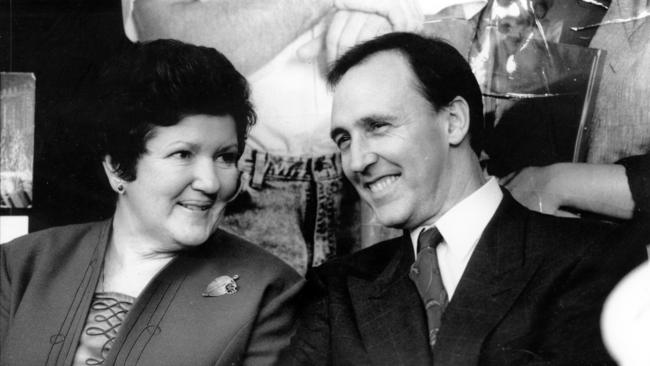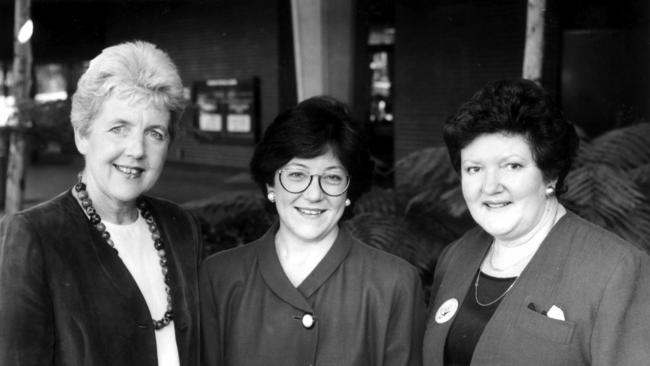Women have a civilising impact on politics: Keating
Paul Keating doesn’t want a debate with Scott Morrison on quotas for female MPs, but he can vouch for their worth.

Morrison was signalling for the first time that a tectonic shift might be needed on his side of politics to secure justice for women in the wake of allegations about their treatment in Canberra that have rocked his government.
For decades, the Liberal Party and its Nationals coalition partner have resisted mandating gender equality in their parliamentary ranks.
The Prime Minister has put the issue on the agenda, drawing support from backbenchers in the most populous states, NSW and Victoria, even if others dismiss gender rules as a threat to the principle of selecting candidates on merit.
Former Labor PM Paul Keating does not want a direct debate with Morrison about the best way to achieve parliamentary representation that more accurately reflects the general population.
But Keating knows what it is like to face internal resistance when measures to introduce gender equality, and bring about cultural change, upset the existing order.
When he threw his authority as prime minister behind introducing quotas for female Labor MPs at the ALP’s 1994 national conference, Keating prevailed. But not without protests from male faction leaders and others afraid of losing their traditional grip on power and, most critical of all, their seats.
Keating says Labor would not be in its current position of close to 50 per cent female representation in federal and state parliaments without the changes pushed through his party almost 27 years ago.
“Without quotas, I think there would be more women than there were, but nothing like the numbers we have now,” he tells Inquirer. “It would never have been possible without the positive discrimination in their favour.”
The Australian chapter of US-based EMILY’s List, started by the late former Victorian premier Joan Kirner and other Labor women in the early 1990s, encouraged high-quality potential female candidates so that quotas, if introduced, could install women of merit.
Keating says EMILY’s List was important to the gender equality campaign, but Labor’s male-dominated factions would never have agreed to equal representation by themselves: “The positive discrimination of quotas brought numbers that would not have naturally occurred in the factional system.”
Keating was well acquainted with Kirner as they’d worked together on the $1.6bn State Bank Victoria bailout in 1990 when he was treasurer. Four years later he agreed to use his imprimatur as PM to back quotas for the cause of equality. “And so I, then, as prime minister, gave it the support. It’s the prime minister’s commitment that matters, it’s not the factions. You needed the factions there, mechanically, but it needed something to be said. I said, ‘Look, this is half the population, they’re just massively under-represented, appallingly under-represented, and passed over by people often who are nothing like as good as they are’.
“But because they all had children and families, women were not on the factional roadway network. They might have got lucky and won a preselection, but they didn’t have deep-rooted factional connections.”

Could it plausibly be argued, Keating asks, that women Labor MPs now are any less talented than their male counterparts? Or that the factions that run Labor, led by men, have always operated according to merit rather than self-interest and controlling the numbers? Keating believes it would take a brave man indeed to argue the case for these claims in any party, based on a survey of the quality of elected MPs.
Even then, the rules Labor introduced with Keating’s explicit backing in 1994 did not require gender equality overnight. It was a staged process to progressively bring more women into parliament. The 50 per cent objective is almost achieved.
Morrison appointed seven women to his recently reshuffled Coalition cabinet. The Prime Minister is responsible for more women in cabinet than ever before, and this decisive move, while a political response to an immediate crisis, suggests he is willing to address a long-term imbalance.
Female representation in parliament for the Liberals more generally remains woeful as a reflection of the population at large. In the House of Representatives, if Queensland’s LNP members are taken into account, women represent just 21 per cent of the cohort. The proportion of Liberal women is significantly healthier in the Senate at 40 per cent. There was an equal number of incoming new male and female Liberal MPs at the 2019 federal election, indicating the party organisation is behind change, but pledges on gender equality often seem more talk than action.
Keating disputes that positive discrimination weighs against merit. “The answer to that is: how can you say that half the community doesn’t have merit? How could you argue that such a huge representative proportion of the community — half — are not going to find, by any measure, people of talent?”
He also acknowledges quotas are a fact of life in government agencies, based on 2016 targets for the Commonwealth Public Service, and in the corporate world.

There is, Keating says, a “civilising” impact with more women at the front line of public life.
“Women think differently (to men) about a whole range of things, and I find they’re very earnest. They take responsibilities seriously, they don’t shirk them. Theirs is a difficult role in the world. Most of them are having children at some point. They’ve got to do that and keep an eye on (their careers). So you’re getting an outcome in a cabinet room that an exclusively blokey outcome would not provide.
“In other words, there’s a feminine quality to the decision-making which is, of its essence I believe, more communal.”
More women Labor MPs, Keating argues, has had a “feminising” as distinct from “feminist” influence on decision-making. “This of course goes to selection, decisions on policy, but also the selection of people. There is something fundamentally wrong with a society where half the population is barred. I never wanted to be part of that society.”
John Della Bosca, who was general secretary of Labor’s largest branch in NSW before serving as a state government minister, worked behind the scenes with others to help push Keating’s female quotas edict in 1994.
Della Bosca recalls: “PJK was the captain on the bridge steering the ship with few prepared to cross him, while I was in the factional engine room sweating it out and getting a lot of lip from dissidents. In the end, I moved the motion on quotas in the right-wing caucus and turned more than one friend into an enemy.”
There are no regrets, Della Bosca says. He remains an ardent supporter of affirmative action and dismisses claims that quotas are inherently anti-democratic.
“All democratic systems rely on mechanics, and the mechanisms as they existed before affirmative action was introduced. Not deliberately, but these mechanisms were certainly disadvantageous to women candidates.

“Whether you’re talking about the culture of the factions, or rank-and-file preselections, and the different interests of women in pursuing careers or not, there was a range of specific disadvantages. So I disagree that affirmative action was anti-democratic — in fact it was very pro-democratic. It enhanced party democracy rather than taking away from it.”
Quality of candidates, says Della Bosca, is a long-term issue. “If you look over the long term since Labor introduced quotas in electable seats, or just at a snapshot of parliamentary parties as they are now, and do a quick summary of the qualities of the women MPs and male MPs, there is no obvious advantage or superiority on the part of the male MPs.
“Women who have come through under affirmative action systems, some of whom have benefited directly from affirmative action, have generally compared with their male colleagues as equivalent, or higher quality, in terms of leadership, ethics and political capacities.
“There’s very few women in the tail, but there’s a lot of blokes in the tail, in terms of capacity.”
Della Bosca goes further with a heartfelt but cheeky observation about the Liberals’ persistent opposition to quotas.
“Federally, if you compare Labor women to Coalition women, despite the fact that Coalition women haven’t been subject to affirmative action, there is almost no doubt that the Labor women are bigger and better contributors to their party than their Coalition counterparts.”
Della Bosca agrees with a recent assessment by The Weekend Australian’s editor at large, Paul Kelly, that despite many talented women in their ranks, the Liberals have failed to develop a strong, effective, high-profile women’s brand, and lack nationally recognised female leaders.
“That’s absolutely right. There is no Coalition equivalent. There is Michaelia Cash and Marise Payne, but really in terms of their clout in the community and influence in their own party, there is no equivalent on the scale of Penny Wong or Tanya Plibersek or Kristina Keneally. Or even some new people coming through like Anne Aly and Clare O’Neil.”
Della Bosca rejects that quotas for women MPs somehow open the door to various minority groups claiming they deserve proportional quotas as well.
“It’s a numbers game in that women are a little over 50 per cent of the population. If minority groups suggest they are entitled to representation, well, they can do that by setting up their own political parties or running as independents … But women are not a minority, women are a majority.”


When Scott Morrison volunteered he was “very open” to the idea of the Liberals introducing quotas for women MPs last month, he was not just acknowledging his party had a gender problem.